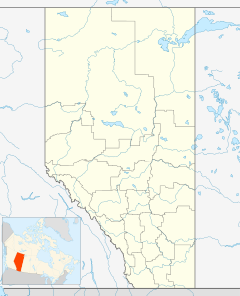Improvement District No. 24 Wood Buffalo
| Wood Buffalo National Park | |
|---|---|
|
IUCN category II (national park)
|
|

Wood bison
|
|
| Location | Alberta & Northwest Territories, Canada |
| Nearest city |
Fort Chipewyan Fort Smith |
| Coordinates | 59°23′N 112°59′W / 59.383°N 112.983°WCoordinates: 59°23′N 112°59′W / 59.383°N 112.983°W |
| Area | 44,807 km2 (17,300 sq mi) |
| Established | 1922 |
| Governing body | Parks Canada |
| UNESCO World Heritage Site | |
| Criteria | Natural: (vii), (ix), (x) |
| Reference | 256 |
| Inscription | 1983 (7th Session) |
|
[]
|
|
Wood Buffalo National Park, located in northeastern Alberta and southern Northwest Territories, is the largest national park in Canada at 44,807 km2 (17,300 sq mi). Larger in area than Switzerland, it is the second-largest national park in the world, and thirteenth-largest protected area in the world. The park was established in 1922 to protect the world's largest herd of free roaming wood bison, currently estimated at more than 5,000. It is one of two known nesting sites of whooping cranes.
The park ranges in elevation from 183 m (600 ft) at the Little Buffalo River to 945 m (3,100 ft) in the Caribou Mountains. The park headquarters is located in Fort Smith, with a smaller satellite office in Fort Chipewyan, Alberta. The park contains one of the world's largest fresh water deltas, the Peace-Athabasca Delta, formed by the Peace, Athabasca and Birch Rivers. It is also known for its karst sinkholes in the north-eastern section of the park. Alberta's largest springs (by volume, with an estimated discharge rate of eight cubic meters per second), Neon Lake Springs, are located in the Jackfish River drainage. Wood Buffalo is located directly north of the Athabasca Oil Sands.
This area was designated a UNESCO World Heritage Site in 1983 for the biological diversity of the Peace-Athabasca Delta, one of the world's largest freshwater deltas, as well as the population of wild bison.
...
Wikipedia

